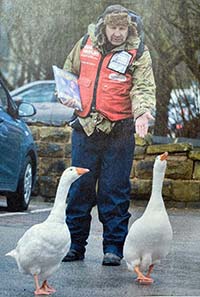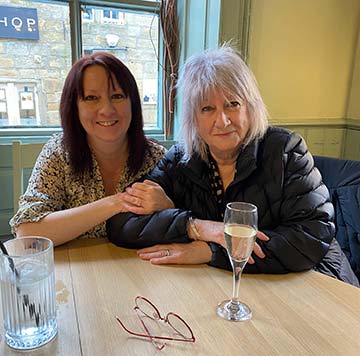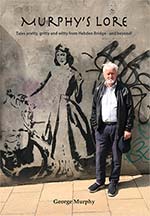
Fourth series, episode 5
All 137 episodes are available here on the HebWeb.
In episode 5 there's a Big Issue and a history of tea, a wet T-shirt and innocents who died, Ted Hughes, a pair of mums, and Einstein on the run and on his hols.
 The Big Issue
The Big Issue
Mark Dransfield featured in last week's Big Issue. He often shares the Hebden Bridge Co-op carpark pitch with a pair of geese, whose offspring live in the grounds of the Methodist Church across the way.
Mark once had to shepherd both geese and goslings across the zebra crossing, an act someone caught on video, causing Mark to become a short-lived sensation on social media.
Fame doesn't always lead to riches. His sales have dropped 20 per cent since Lockdown. Big Issue is a life saver for some. The deal is, for every £4 sale sellers keep £2. So I bought a copy.
Tea tales
My present wife heard a late night programme on Radio 4 about the value of drinking a special drink. So for the last few weeks I've been drinking green tea, which hopefully does less damage on its journey to my synapses than some other addictions.
I've looked up an old compilation of How we Live Now, Melvyn Bragg's long running Radio 4 programme printed up in paperback, for its chapter on Rosie Lee, as Ray Davis calls it.
Apparently, tea is the most widely consumed product on the planet, and was drunk for thousands of years before the expansion of trade in the East in the late 17th century led Europeans to discover its delights. Within half a century it became Britain's national drink.
Unlike the Chinese, we drank our porcelain ('china') cuppas with the added ingredient of sugar. Trade triangles developed involving tea – especially from new plantations in India – and slaves from West Africa, who were shipped to the Caribbean to work on sugar plantations, which were owned by British slave owners. This arrangement made the slave and plantation owners rich, whilst rotting our teeth.
In China, tea was originally drunk for medicinal reasons, and recent research has shown that green tea molecules attack tangles of the protein called tau, a hallmark of Alzheimer's disease, causing a 16 per cent drop in numbers of dementia sufferers. Now scientists are looking for more efficient ways of transmitting the molecule more directly into the brain. One tactic is to reuse teabags; it's the gritty stuff floating around in there that does the business.
The secrets of tea growing had whispered their way across the East China Sea to Japan by the 12th century. Again, it soon became established as the national drink. A recent longitudinal study found that Japanese tea drinkers who consumed 7 cups of green tea per day had a 62 percent decreased risk of death from all causes than those who only averaged 1 cup per day.
So I'm currently binging on a couple of mugs of green tea per day. Although my favourite herbal tea is camomile, which I drink before bedtime. I'm reading Henry James's The Bostonians at the moment, and the other night, after my camomile night cap, I nodded off halfway through one of Henry's beautifully crafted and famously clause packed sentences.
The third eye
Esteemed storyteller Ben Haggarty, once toured round the world with YoYo Mah. I heard him tell a version of this old Spice Road tale at Stubbing Wharf a decade ago. Every tale is retold in a different way. Here's my version.
Tong Ling owned a tearoom next to the market square, where he sold green tea, predicted the future and kept an eye on people visiting the market stalls. The village was splayed across a mid-altitude plateau, which was surrounded by tall, cone shaped peaks. One fine day in early spring, when the thin air was saturated with the sounds of rushing waters rising from sparkling cascades in lush hidden valleys, two evil spirits walked past his café. With his psychic powers, Tong ling could see the undead creatures quite clearly; they were Gui ghosts, who thrived by sucking the life spirit from humans.
Just then a postboy crossed the market with a letter held aloft in a cleft stick. The Gui ghosts, one purple, one green, fell into step behind him. The post boy zig zagged through the crowds then marched across the lane behind Tong Ling's tea room to the house of the teacher Laozi. Tong Ling rushed after them and saw the maid let the post boy into the house, but was too slow to prevent the Gui from flitting into the building before the door was shut. Full of foreboding he returned to his chambers above his tearoom. It wasn't long before he saw the maid rush from the front door, returning in short time with Doctor Yi sheng. Tong Ling rang for a tea and awaited developments. As the market emptied and dusk fell he saw his old friend Yi sheng leave the house, shaking his head.
Tong Ling drained his cup then went across to the teacher's house. When the maid opened the door, her eyes wet with tears, he asked, "Has anyone suddenly fallen ill inside this house?"
"Yes sir," she answered with a quavering voice, "Miss Li Xiu, has a terrible affliction."
She led him through the hall towards a room where Li Xiu had collapsed. He could plainly see the Gui ghosts crouched above her, sucking the life spirit from her with long straws. He hurriedly told her weeping parents what they must do.
"First fill any gaps in the walls of the room with folded paper. Then bring me a metal pan and a heavy serving spoon. Finally, let no one enter the room until I come out."
Soon family and servants had met his requirements, then retreated outside the room. Inside which Tong Ling clattered the metal pan as loudly and discordantly as he could manage. The Gui dropped their straws, covered their ears with their hands and trained their piercing red eyes upon the intruder who was tormenting them. Slowly the life spirit returned to Miss Li Xiu, just as it drained from her twin tormentors.
Still Tong Ling crashed the kitchen spoon against the metal pan, as Li Xiu's parents and staff huddled together by the door. But little Muchen, desperate to see his big sister again, stood on tiptoe and pulled the folded parchments from the key hole in the door to see what was happening.
With a whoosh, the Gui flew through the key hole and out of the house!
Tong Ling opened the door and the parents rushed in to hug and console their daughter. Eventually, the teacher turned to Tong Ling and promised that he would spread his fame far and wide. Soon he would be renowned for his prowess! When he pressed a few coins into his hands, Tong Ling bowed. He was most pleased to have saved the life of the young girl and he gently tousled the hair of her young brother but he left the house knowing that it would not be the last he would see of Li Xiu's tormentors.
Soon enough, tales of Tong Ling's feats spread across the province. So much so, that Huia Nan the local Emperor, became jealous of the tearoom owner's fame. He sent for him. And when Tong Ling arrived at the Emperor's castle, Huia Nan told him he was not sure if he could believe in his miraculous powers, so he would set him a task. But if he failed he would be beheaded in the public square when the sun rose over the mountain next morning.
The Emperor clapped his hands and a monk brought in a small cage which was covered by a silk cloth. The courtiers, who were arrayed on seats at either side of the hall, leaned forward to see the spectacle.
"How many animals are under the cloth?" the Emperor demanded.
"Two, my lord," Tong Ling replied, with no sign of hesitation.
But when the monk pulled back the silken cloth, revealing a single fat rat sitting sedately on a plump cushion, there was a startled gasp from the ranks of courtiers.
"As I thought Tong Ling. You are a trickster, just a simple magician without any sacred powers. Guards! Take him to his cell!"
That night the court physician could not sleep. He knew that Tong Ling was an honourable man. He rang for his manservant and told him to bring him the rat in the cage. The fat rat was brought to him and the physician dissected the rodent and discovered it was pregnant. Tong Ling had been right after all!
Next morning, before daybreak, as people started to gather in the square, the physician visited the Emperor and revealed that two animals and not one was the true answer to the Emperor's question. So the Emperor commanded his guards to raise the flag from above the castle wall when the sun rose above the horizon, signalling to the crowd and the executioner that Tong Ling was innocent.
Tong Ling was brought out to the square. He exchanged bows with the executioner. Then two guards led him forward and he knelt down and rested his head on the execution block. As the first rays of sunshine rose over the nearby hills Tong Ling looked up to the castle walls where the guards were trying to haul up the Emperor's flag. But only he could see the two Gui ghosts laughing and swinging merrily around the flag pole to prevent the raising of the flag. Then he felt the obliterating shock of the axe, but as the executioner raised his severed head for the crowd to witness, only his third eye saw for a few moments the mocking faces of the Gui ghosts as they waved from the flag pole.
Wet T shirt competition
Last week, Bankfield museum successfully bid £20,000 for Colin Firth's wet T shirt. Over the years, visitors to the museum have contributed towards a fund which allows the museum to bid for such artefacts. Years ago, in one of my educator roles, I discovered that Bankfield have a collection of antique costumes in safe storage, and I presume they also add to their coffers by garment loans to film and television companies.
PW still likes to watch Pride and Prejudice on a regular basis. Some think Miss Elizabeth fell in love with Darcy after seeing him emerge saturated from a spot of wild swimming, but PW reckons it was a tour round his mansion that did it.
During the series, I wondered aloud if Firth's pained expression was due to him suffering from a prolonged bout of constipation, and, in a recent interview, he admitted that was also his father's comment on his performance. Although, watching the later series starring Matthew McFadyen, that chap from Succession, his Darcy also looked as if he needed a few doses of laxative.
The Push
This TV documentary was remarkable in several ways, not least for the live filming of the scenes inside a Scottish court, including interviews with both the defence and prosecution lawyers. There was a stark contrast with the romantic scenes on Arthur's Seat in One Day, as stills and CCT film disclosed the slow trudge of the 4 months pregnant Fawziyah Javed and her husband Kashif Anwar who were visiting Edinburgh. Fawziyah was seen falling down the 45 degree slope. A woman tourist managed to reach her as she lay dying. Fawziyah told her, 'don't let my husband near me, he pushed me.'
Being a lawyer, Fawziyah Javed had secretly recorded phone calls of Anwar threatening her if she ever left him, shouting, "You're not a man, so start behaving like a woman."
The jury were the only people we did not get to see, but they delivered a guilty verdict by a majority decision. Anwar was sentenced to a mandatory 20 years imprisonment.
Remains of Elmet
The family of Ted Hughes have joined in the chorus of complaints against the proposals for a giant windfarm on our local moors. In his letters (2007), he writes to Fay Godwin, who had proposed the concept of a photographic record of the lost and crumbling houses of Calder Valley, a project which became Remains of Elmet in 1979, with Hughes providing the written commentary. He explained to her his reaction to the upper Calder valley.
"What grips me about the place, I think, is the weird collision of that life of slavery – to work, cash, Methodism – which was an heroic life really, and developed heroic virtues - inside those black buildings, with that wilderness, which is really a desert, more or less uninhabitable … A fellow called John Greenbank, was a farm-hand behind Heptonstall, became a demolisher and is now single-handed erasing the last 150 years … If only some of that could be caught in photographs – the way the primaeval reality of the region is taking over again from the mills, chapels, farms, pubs, bowling greens and cricket pavilions, pompous houses and rhododendrons, walls and reservoirs, stonework of nineteenth century giants, and the black peculiarities of the triangle – Colne, Todmorden and Halifax. I realise now I was living in the last days of Pompei."
Mothers' Day

It's 28 years since my mum died. I remember when Dot had her 28th birthday, which must have been on New Year's Day in 1956. I was five, and she had nimbly climbed up on a chair to gather some cups from a high shelf in the kitchen.
Back in the fifties, families with kids weren't allowed in pubs. Forward to 2024, we booked a table at the White Lion on the Saturday before Mothering Sunday (as it would be less crowded), and Leah brought 10 year old Rosie along, though the presents from Jude and Rosie couldn't be opened till the following day. Rosie didn't eat, having a peanut and egg allergy, conditions which weren't around, or not recognised, in the 1950s.
Einstein in England
Oppenheimer swept the board in the Oscars, and remembering Einstein and Oppenheimer's differing views on the Atom Bomb, I noticed reports of the time when Einstein fled to a hideaway in the 1930s.
Knowing that Hitler had put a price on his head, Albert Einstein and his wife escaped to England in 1933. In October he emerged from hiding to talk "to a gripped audience overflowing the massive Royal Albert Hall." (Time Magazine). Without our long fought for European freedom of mind, Einstein said, "there would have been no Shakespeare, no Goethe, no Newton, no Faraday, no Pasteur and no Lister." A new book, due out this October, argues that Einstein recognised the need to develop the A bomb before Hitler beat the west to it.
Few know about Einstein's earlier visit to these shores, in his magical year of 1904, when young Albert spent a few weeks in Hebden Bridge.
Mr E
Said a Tourism Chief of renown,
When visitor numbers were down,
'Albert Einstein once stayed in this town.'
I said, 'He didn't!'
'He did.'
'He didn't!'
'He did. He stayed in Grand View, B&B
And locals called him, Mr E.'
I said, 'Well, what else did he do in these parts?'
'He wor a bit of a dab hand at darts.'
'He worn't!'
'He wor.'
'He worn't!'
'He wor. He scored a nine dart finish from t' ochie.'
'He didn't!'
'He did.'
'He didn't!'
'He did. For t' Railway against t' Horse and Jockey.
But t' main thing he did on vacation,
Wor to think on a special equation.
Mind, I only wish I'd had a ticket
To see Mr E playing cricket.'
'He didn't!'
'He did.'
'He didn't!'
'He did. He wor a spin bowling sensation.'
'He worn't!'
'He wor.'
'He worn't!'
'He wor. Bamboozled batsmen with his oscillations.
And he went on long peregrinations,
To off beaten track destinations,
Just to think on his special equation.
Mind, he went to a music hall show,
Emceed by a comedy duo.
And t' straight man, being more sage,
Got Mr E up on stage.
He admitted on sporting occasions,
He made use of simple equations.
But all this wor just a rehearsal
For stating a law universal.
Comic MC said, "He's clever,
He's got twice our brains put together!"
'Then, "That's it!" Me E declares!
An' he points to himself,
Then he points to MCs and said …'
'He didn't!'
'He did.'
'He didn't!'
'He did. He said "E equals MC squared!'
Murphy's Lore, the book, is available to order here
If you would like to send a message about this piece or suggest ideas, email George Murphy
More Murphy's Lore
See the Murphy's Lore home page for all 137 episodes.


